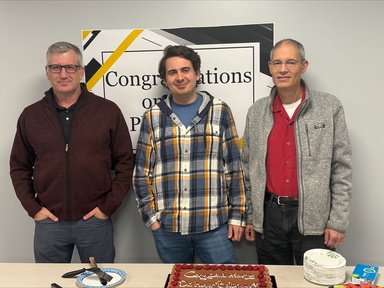
Congratulations to PhD candidate Kevin Bollinger on the successful defense of his dissertation, titled “Discovery and Characterization of a Novel L,D-Transpeptidase Domain That Makes Essential 3-3 Crosslinks in C. difficile,” which took place on Wednesday, October 29, 2025. He is pictured alongside his mentors, Dr. Craig Ellermeier and Dr. David Weiss.
Research
Clostridioides difficile is an opportunistic gastrointestinal pathogen that can colonize the gut and cause infection when the microbiota is disturbed, typically through broad spectrum antibiotic use. Antibiotics are the first course of treatment for C. difficile infection and are typically good at treating the initial infection. However, about 1 in 5 of those treated end up with a relapse C. difficile infection within a few months. Additionally, every relapse infection increases the likelihood of a subsequent relapse infection. This can lead to a person having multiple C. difficile infections over the course of many years and severely lowers their quality of life. Alternatives to our current treatment options are needed to improve patient outcomes.
Our lab focuses on studying the cell envelope of C. difficile with the goal of finding essential proteins or structures in C. difficile that are not essential in other bacteria. These uniquely essential aspects of C. difficile may be good targets for the development of narrow spectrum antibiotics that could improve patient outcomes. My work has primarily focused on studying the peptidoglycan (PG) in the cell wall of C. difficile. PG contains a repeating disaccharide subunit that forms long strands. There is a peptide sidechain on each disaccharide subunit that is used to crosslink the strands of PG together which is important for the structural integrity of the cell wall. These crosslinks are made by two classes of proteins: penicillin-binding proteins (PBPs) utilize a pentapeptide sidechain to make 4-3 crosslinks and L,D-transpeptidases (LDTs) use a tetrapeptide sidechain to make 3-3 crosslinks. In most bacteria only the PBPs and their 4-3 crosslinks are essential. However, we found that in C. difficile the LDTs and the 3-3 crosslinks they make are also essential, which made it the first organism in which LDTs were shown to be essential. Additionally, during our investigation we discovered a novel catalytic LDT domain, called the VanW domain. Loss of the LDTs in C. difficile results in a decrease in cell wall integrity and leads to cell lysis. We also found that D-alanyl-D-alanine carboxypeptidases (DD-CPases) are responsible for converting the pentapeptide sidechains in the cell wall into tetrapeptide sidechains. This DD-CPase activity deprives the PBPs of their substrate which causes the LDTs to be essential. However, it is unclear “why” C. difficile synthesizes its PG in a manner that makes the LDTs essential as there is no clear advantage to having a lot of 3-3 crosslinks.
Altogether these studies highlight the LDTs as potential targets for the generation of novel narrow spectrum antibiotics for C. difficile.
Background
Kevin, the middle child of three, was born and raised in Montclair, New Jersey. He first became interested in science in middle school when he joined the Science Olympiad team. In high school, he joined the local STEM community and became interested in biological sciences. After a summer program at the CDC, he knew he wanted to study microbiology and infectious diseases in college.
His interest in science then brought him to the University of Michigan – Ann Arbor for his undergraduate studies in 2016. At the University of Michigan, he majored in microbiology and became interested in getting research experience. In his first lab he worked with the nematode C. elegans and quickly realized that he had no interest in working with eukaryotic organisms. This led to him working in the lab of Dr. Suzanne Dawid, which studied bacteriocin production in Streptococcus pneumoniae, which is regulated through quorum sensing. In Dr. Dawid’s lab he contributed to a publication showing that the regulator for bacteriocin production, BlpC, is post-translationally processed before it can activate the BlpHR two-component system. After that initial research experience Kevin knew he wanted to continue doing research and so he applied to graduate school.
In 2020, Kevin decided to stay in the Midwest and started his graduate studies here at the University of Iowa, and in 2021 joined the labs of Craig Ellermeier and David Weiss. His graduate work focused mainly on investigating the bacterial cell wall in Clostridioides difficile. While working on his project he began to develop an interest in the more foundational aspects of his research regarding how the bacterial cell wall is synthesized and maintained. His research has led to one first author publication with at least one more planned to be submitted. While in Criag’s and David’s labs he was also able to present his research at multiple conferences both domestically and internationally. He plans to continue studying the cell wall in his future research endeavors.
When not in the lab Kevin enjoys reading fantasy and sci-fi books, playing games with friends and family, and baking and experimenting with new recipes, often bringing any extras into lab to share.